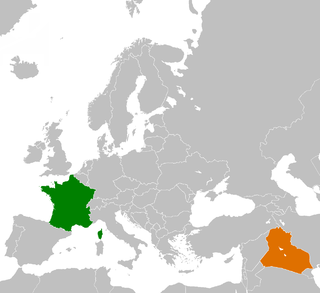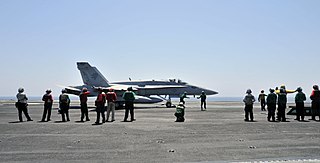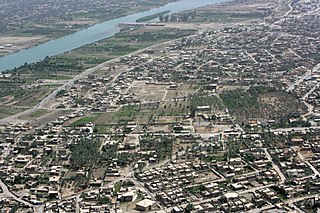 | |
Iraq | Poland |
|---|---|
The Iraqi-Polish relations are the official bilateral relations and diplomatic relations between Iraq and Poland. Iraq has an embassy held in Warsaw. Poland has an embassy in Baghdad.
 | |
Iraq | Poland |
|---|---|
The Iraqi-Polish relations are the official bilateral relations and diplomatic relations between Iraq and Poland. Iraq has an embassy held in Warsaw. Poland has an embassy in Baghdad.
In the mid-19th century, under Ottoman rule, Polish physician and émigré activist Stanisław Drozdowski took part in eradicating the plague epidemic in Baghdad for which he was awarded the title of Pasha of Baghdad. [1]
In 1942, during the evacuation of Polish civilians from the USSR in World War II, some Polish military personnel under General Władysław Anders, were evacuated to Iraq, while some Polish civilians went to refugee camps in Iran. [2]
In the 1980s, Poland stayed neutral in the Iran–Iraq War. [3]
In August 1990, following Saddam Hussein's invasion of Kuwait, Polish intelligence agents rescued six U.S. intelligence officers out of Iraq (via Turkey). At the time, several thousand Poles were in Iraq working on construction projects, given them a greater ability to avoid detection by Iraqi intelligence. Poland's assistance to the U.S. during the Persian Gulf War, which was revealed in 1995, led to closer U.S.-Poland relations. [4] [5]
In 2003, Poland participated in the U.S.-led 2003 invasion of Iraq, sending about 200 special forces initially. [6] During the Iraq War, Poland was responsible for the Polish zone in Iraq, between Baghdad and Basra; this was one of the four occupation zones in Iraq at the time. [6] Within Poland, there was some disappointment over a sense "that Poland derived too little benefit from its deployment: its efforts to end the visa requirement for the U.S. were rebuffed, and its military complained that it did not get as much financial assistance as it had expected." [6] In 2006, more than 10,500 Polish troops were in Iraq. At the end of 2008, all 900 Polish troops remaining in Iraq were withdrawn, with about a dozen Polish military advisors remaining. [6] [7]
After the Islamic State of Iraq and the Levant threatened Iraq in 2014, Poland provided humanitarian aid to Iraq [8] [9] and gave political support to Operation Inherent Resolve, [8] but hesitated for nearly two years before joining the anti-ISIL military campaign in June 2016. [8] Poland has been an active member of the anti-ISIL coalition since. [10]


James Franklin Jeffrey is an American diplomat who served most recently as the United States Special Representative for Syria Engagement and the Special Envoy to the International military intervention against ISIL.

The Iraqi Armed Forces are the military forces of the Republic of Iraq. They consist of the Iraqi Army, the Iraqi Air Force, and the Iraqi Navy. Along with these three primary service branches, there exists the Iraqi Counter Terrorism Service and the Popular Mobilization Forces. The President of Iraq acts as the supreme commander as outlined by the constitution.
Operation Simoom was a top secret Polish intelligence operation conducted in Iraq in 1990.

French–Iraq relations are the relations between France and Iraq. France played a major role in Iraqi secession from the Ottoman Empire and eventual freedom from British colonial status. The Franco-Iraqi relationship is often defined by conflict and peace, with France supporting Iraq during the Iran-Iraq War, supporting intervention in Iraq in Operation Desert Storm, and opposing the 2003 U.S. Invasion of Iraq. As of 2004, Iraq maintains an embassy in Paris and France maintains an embassy in Baghdad and a consulate general in Erbil.

Iraqi–Italian relations are the interstate ties relations between Iraq and Italy. Iraq has an embassy in Rome and Italy had an embassy in Baghdad and a consulate-general in Basra. Iraq has severed all ties with Italy since July 2023.
Qayyarah Airfield West is an Iraqi Air Force base in the Qayyarah subdistrict of Mosul District in northern Iraq. It was captured by U.S. Army during Operation Iraqi Freedom in 2003. It was also known as Q–West or Key West by the various U.S. Army Forces and civilian contractors stationed there. Control of the base was returned to Iraq in March 2020.
Operacja Samum is a 1999 Polish spy film directed by Władysław Pasikowski, starring Marek Kondrat, Bogusław Linda, and Olaf Lubaszenko. The film is a fictional account of Operation Simoom, a top secret Polish intelligence operation to withdraw CIA agents before the start of the Persian Gulf War.

In response to rapid territorial gains made by the Islamic State during its 2014 Northern Iraq offensives, universally condemned executions, human rights abuses and the fear of further spillovers of the Syrian Civil War, many states began to intervene against it in both the Syrian Civil War and the War in Iraq (2013–2017). These efforts are called the War against the Islamic State, or the War against ISIS. In later years, there were also minor interventions by some states against IS-affiliated groups in Nigeria and Libya. All these efforts significantly degraded the Islamic State's capabilities by around 2019-2020. While moderate fighting continues in Syria, as of 2023, ISIS has been contained to a manageably small area and force capability.

On 22 September 2014, the United States officially intervened in the Syrian civil war with the stated aim of fighting the Islamic State as part of Operation Inherent Resolve in the international war against the Islamic State. The U.S. also supports the Syrian rebels and the Kurdish-led Syrian Democratic Forces opposed to both the Islamic State and Syrian president Bashar al-Assad.

On 15 June 2014, U.S. President Barack Obama ordered United States forces to be dispatched in response to the Northern Iraq offensive of the Islamic State (IS) as part of Operation Inherent Resolve. At the invitation of the Iraqi government, American troops went to assess Iraqi forces and the threat posed by ISIL.

The Iranian intervention in Iraq has its roots in the post-2003 invasion of Iraq by the United States and allies when the infrastructure of the Iraqi armed forces, as well as intelligence, were disbanded in a process called "de-Ba'athification" which allowed militias with close ties to Tehran to join the newly reconstituted army.

Operation Inherent Resolve (OIR) is the United States military's operational name for the international war against the Islamic State (IS), including both a campaign in Iraq and a campaign in Syria, with a closely related campaign in Libya. Through 18 September 2018, the U.S. Army's III Armored Corps was responsible for Combined Joint Task Force – Operation Inherent Resolve (CJTF—OIR) and were replaced by the XVIII Airborne Corps. The campaign is primarily waged by American and British forces in support of local allies, most prominently the Iraqi security forces and Syrian Democratic Forces (SDF). Combat ground troops, mostly special forces, infantry, and artillery have also been deployed, especially in Iraq. Of the airstrikes, 70% have been conducted by the military of the United States, 20% by the United Kingdom and the remaining 10% being carried out by France, Turkey, Canada, the Netherlands, Denmark, Belgium, Saudi Arabia, the United Arab Emirates, Australia and Jordan.
In early 2014, the jihadist group Islamic State of Iraq and the Levant captured extensive territory in Western Iraq in the Anbar campaign, while counter-offensives against it were mounted in Syria. Raqqa in Syria became its headquarters. The Wall Street Journal estimated that eight million people lived under its control in the two countries.

The Battle of Ramadi was a battle launched by the forces of Iraq to successfully recapture the city of Ramadi from the Islamic State of Iraq and the Levant (ISIL), which had taken the city earlier in 2015 in a previous battle. Air power was a major component of the battle, with the United States and other nations conducting over 850 airstrikes in the Ramadi area from July 2015 to late February 2016, and the US crediting airstrikes with 80% of the reason why the city was recaptured. By February 2016, Iraqi forces successfully recaptured the city after two and a half months of fighting. It was predicted that it would take several months to clear the city of the bombs ISIL left behind, with at least 9 months needed to clear the city's Tamim District. At the time, Ramadi had suffered more damage than any other city or town in Iraq.

The Shirqat offensive, codenamed Operation Conquest or Operation Fatah, was an offensive against the positions of the Islamic State of Iraq and the Levant (ISIL) in and around the district of Al-Shirqat District to reach the city of Mosul.
The Battle of Hit, code named Operation Desert Lynx by Iraqi forces, was an offensive launched by the Iraqi Government during the Anbar offensive, with the goal of recapturing the town of Hīt and the Hīt District from ISIL. After the Iraqi forces recaptured the city of Ramadi, Hīt and Fallujah were the only cities still under the control of ISIL in the Al Anbar Governorate. Iraqi Forces fully recaptured of Hīt and the rest of the Hīt District on 14 April 2016.

Japan–Poland relations refers to the bilateral foreign relations between Japan and Poland. Both nations enjoy historically friendly relations, embracing close cooperation and mutual assistance in times of need. Both are members of the OECD, World Trade Organization and United Nations.

Iran–Poland relations are historical and bilateral relationship between the Islamic Republic of Iran and the Republic of Poland. Both nations are members of the United Nations.

The Islamic State insurgency in Iraq is an ongoing low-intensity insurgency that began in 2017 after the Islamic State (ISIS) lost its territorial control in the War in Iraq, during which ISIS and allied White Flags fought the Iraqi military and allied paramilitary forces.

Douglas Alan Silliman is the president of the Arab Gulf States Institute in Washington and a former American diplomat who served as United States Ambassador to Kuwait (2014-16) and Iraq (2016-19).
{{cite book}}: CS1 maint: location missing publisher (link)